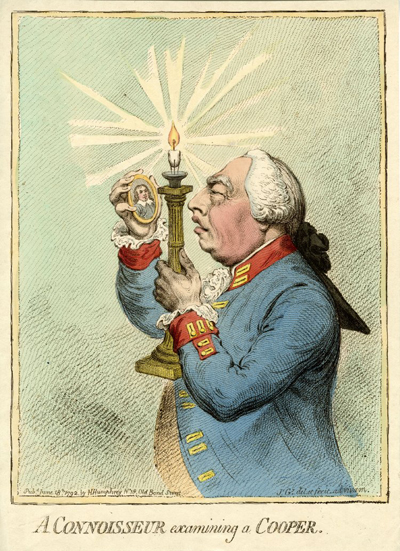The King of Brobdingnag and Gulliver
This brilliant print is one of the purest examples of caricature's capacity to diminish its satiric objects (in this case Buonaparte) by a reduction in their size. It was one of a number of prints published in the wake of the failure of the Peace of Amiens and the resumption on the war against France—all of which used similar techniques to convince British subjects that Buonaparte was NOT the formidable presence they might have thought he was.

© Trustees of the British Museum
The print was not, however, "invented" by Gillray, and, indeed, he takes no credit for it in the publication or signature line. It is based rather on a drawing by Thomas Braddyll, an amateur caricaturist and a lieutenant in the prestigious Coldstream Guards, among whose responsibilities was the protection of the monarchy. Braddyll had first provided Gillray with a sketch and idea for A Military Sketch of a Gilt Stick, or Poker Emblazoned, based on one of his superior officers in 1800, and later he also provided the initial drawings for another print of The King of Brobdingnab and Gulliver (1804), St. George and the Dragon (1805), and Farmer Giles and His Wife Shewing Off Their Daughter (1809).
But though Braddyll provided the official concept and drawing, his design is based on techniques and images that Gillray had already produced. The miniaturization of Buonaparte, for instance, had already begun in Gillray's German Nonchalence, or the Vexation of Little Boney and Maniac Raving's, or Little Boney in a Strong Fit even before Braddyll's design. The image of King George in profile examining Buonaparte is clearly derived from Gillray's A Connoisseur Examining a Cooper (1792). Even the adaptation of Gulliver's Travels to the current British political situation had been anticipated by Gillray in Lilliputian-Substitutes, Equiping for Public Service (1801).

© Trustees of the British Museum
But in choosing to base his drawing on the climactic scene from Part II, Gulliver's Travels, "A Voyage to Brobdingnag," Braddyll was truly inspired. In that voyage, it is Gulliver who is small, and his host, the King of Brobdingnag, large. Curious to see whether he can learn anything about governing from this little visitor from a foreign land, the King asks a series of probing questions about British history and politics, which Swift uses for full satiric advantage. And despite giving "to every Point a more favourable turn by many Degrees than the strictness of Truth would allow," Gulliver is forced to reveal the extensive corruption permeating every aspect of the British system of government. The King responds:
"My little Friend Grildrig, you have made a most admirable panegyric upon your Country.... But, by what I have gathered from your own Relation, and the Answers I have with much Pains wringed and extorted from you, I cannot but conclude the Bulk of your Natives, to be the most pernicious Race of little odious Vermin that nature ever suffered to crawl upon the Surface of the Earth.
By making Buonaparte stand for Gulliver and George III for the King of Brobdingnag, Braddyll and Gillray found a perfect analogue for the present political state of affairs. Buonaparte's self-serving accounts of his actions in Egypt, the creation of the new French Constitution, and his ascent to the position of First Consul, his overtures to peace, (all of which gave "to every Point a more favourable turn by many Degrees than the strictness of Truth would allow,") were now being exposed for the distortions and exaggerations they were. The meanness, the littleness the untrustworthiness of Napoleon was becoming apparent even to staunch Francophiles like the new Foreign Minister Charles James Fox. And while Buonaparte's stature was diminishing King George's was increasing. He was no longer the short-sighted monarch of A Connoisseur Examining a Cooper [1792], but a larger than life figure whose steadfastness had gained the respect of his people and earned him the right to speak the words derived (with slight modifications to direct them at Buonaparte) from Swift's moral King of Brobdingnag.
Sources and Reading
- Commentary from the British Museum on The King of Brobdingnag and Gulliver.
- Tim Clayton & Sheila O'Connell, Bonaparte and the British, 2015, p. 119
- Diana Donald, The Age of Caricature, 1996, p. 7.
- Draper Hill, Mr. Gillray The Caricaturist, 1965, p. 130.
- Draper Hill, Fashionable Contrasts, 1966, #66.
- "George III," Wikipedia
- "Napoleon," Wikipedia
- "Gulliver's Travels," Wikipedia
- Thomas Wright and R.H. Evans, Historical and Descriptive Account of the Caricatures of James Gillray #286.
- Thomas Wright and Joseph Grego, The Works of James Gillray, the Caricaturist; With the History of His Life and Times, p. 298.
Comments & Corrections
NOTE: Comments and/or corrections are always appreciated. To make that easier, I have included a form below that you can use. I promise never to share any of the info provided without your express permission.